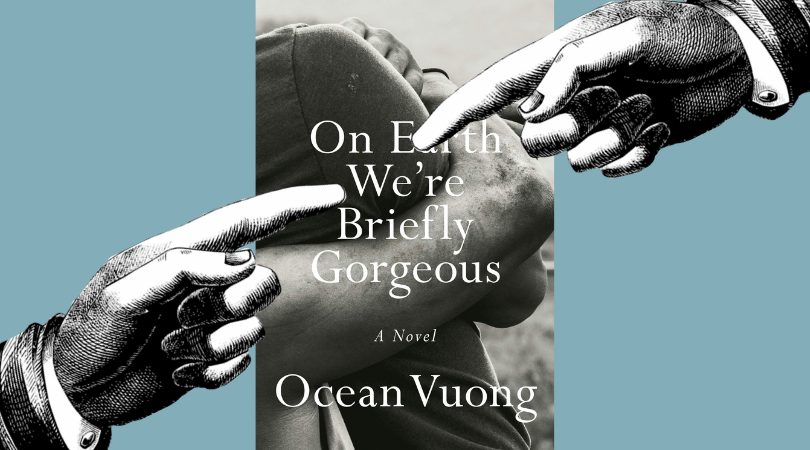
There are few things the literary community relishes more than the appearance of a polarizing high-profile book. Sure, any author about to release their baby into the wild will be hoping for unqualified praise from all corners, but what the lovers of literary criticism and book twitter aficionados amongst us are generally more interested in is seeing a title (intelligently) savaged and exalted in equal measure. It’s just more fun, dammit, and, ahem, furthermore, it tends to generate a more wide-ranging and interesting discussion around the title in question. With that in mind, welcome to a new series we’re calling Point/Counterpoint, in which we pit two wildly different reviews of the same book—one positive, one negative—against one another and let you decide which makes the stronger case.
Despite being only thirty years old, multi-talented Vietnamese-American poet and essayist Ocean Vuong has already won the Narrative Prize, the Whiting Award, and the T.S. Eliot Prize, and his most recent poetry collection, Night Sky with Exit Wounds, was met with rave reviews upon its release in 2016. On Earth We’re Briefly Gorgeous, narrated by a speaker known only as Little Dog, marks Vuong’s first foray into fiction. Framed as a letter to his mother, who cannot read, On Earth We’re Briefly Gorgeous delves into Little Dog’s family history and shares the effects of the Vietnam War on future generations while also revealing parts of his life that his mother has never known.
Overall, Ocean Vuong’s debut novel has received overwhelmingly positive reviews. “Emerging from the most marginalized circumstances, he has produced a lyrical work of self-discovery that’s shockingly intimate and insistently universal,” Ron Charles enthuses in The Washington Post. The New Yorker’s Jia Tolentino observes that “Vuong uses language to conjure wholeness from a situation that language has already broken … The structural hallmarks of Vuong’s poetry—his skill with elision, juxtaposition, and sequencing—shape the novel,” while in the Los Angeles Times Steph Cha commends On Earth as “a book of sustained beauty and lyricism, earnest and relentless, a series of high notes that trembles exquisitely almost without break.”
Despite this preponderance of praise, there were also a couple of dissenting voices to be heard, and chief among them was Dwight Garner of The New York Times, who felt that the novel was only “a mixed success.” Today we’re placing Garner’s review alongside Viet Thanh Nguyen’s TIME appraisal, in which he refers to On Earth We’re Briefly Gorgeous as “an unforgettable—indeed, gorgeous—novel.”
What do you think, reader? Are you willing to spend a little time with Little Dog?
I am writing to reach you—even if each word I put down is one word further from where you are.
“The poems from his book Night Sky With Exit Wounds expose raw hurt, love and joy, and in performing them, he demonstrated the confidence required to reveal himself. Vuong does the same in his compelling, emotional first novel … Vuong as a writer is daring. He goes where the hurt is, creating a novel saturated with yearning and ache. Little Dog is turned inside out by his search for validation, and Vuong imbues his quest with meaning that extends beyond the personal … Vuong refuses to be embarrassed. He transforms the emotional, the visceral, the individual into the political in an unforgettable—indeed, gorgeous—novel, a book that seeks to affect its readers as profoundly as Little Dog is affected, not only by his lover but also by the person who brought him into the world.”
–Viet Thanh Nguyen (TIME)
“Vuong is a mightily gifted observer … On Earth We’re Briefly Gorgeous is, at the same time, filled with showy, affected writing, with forced catharses and swollen quasi-profundities. There are enough of these that this novel’s keel can lodge in the mud … ‘Deep Purple Feeling’ could be an alternative title for certain swaths of this novel … The strongest parts of On Earth We’re Briefly Gorgeous, where this novel picks up genuine force and has some of the mournful resonance of the Bruce Springsteen song ‘The River,’ arrive in its second half. This is where the narrator details his doomed love affair with Trevor, a boy he meets while both work in the tobacco fields … Vuong’s novel is a mixed success, a book of highs and lows. At its best, it’s unleashed in every regard.”
–Dwight Garner (The New York Times)
If you buy books linked on our site, Lit Hub may earn a commission from Bookshop.org, whose fees support independent bookstores.

